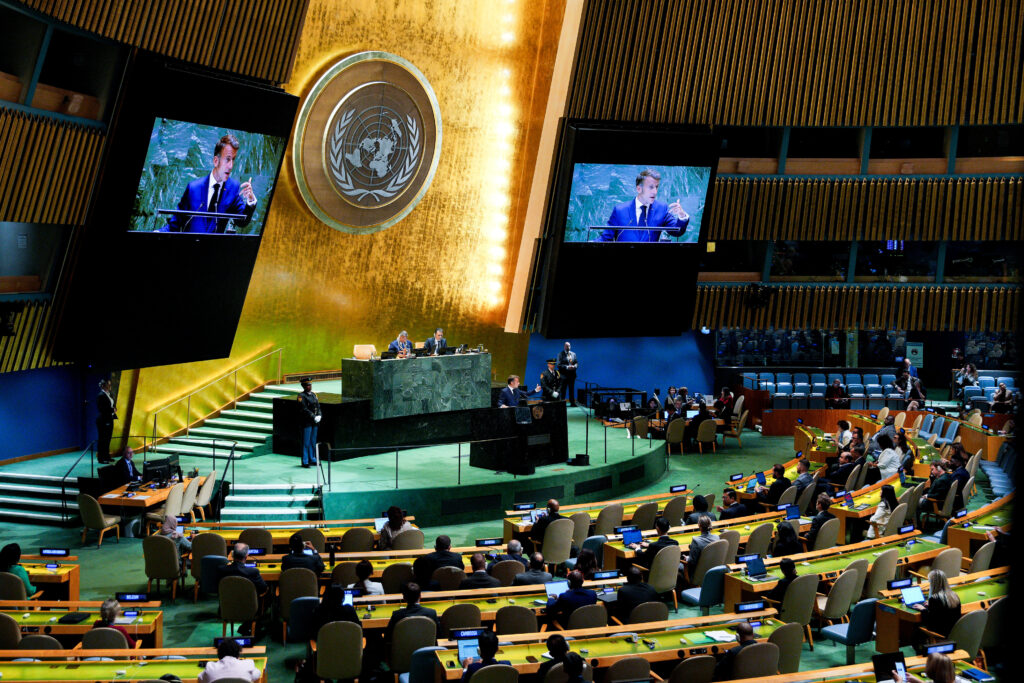Interviews
23 September 2025
Recognition of the State of Palestine: What Prospects Within a Multilateral System in Crisis?

From 22 to 29 September 2025, the 80th session of the United Nations General Assembly is being held, under the theme “Better Together: 80 Years and Beyond for Peace, Development and Human Rights”. Following France, which announced its decision at the end of July, several Western countries officially recognised the State of Palestine on 22 September. What will be the real impact of this decision within the international system? At a time when multilateralism is being undermined by the growing disengagement of the United States, in what international context does this decision take place? Insights from Anne-Cécile Robert, journalist, specialist in European institutions and international organisations, deputy director of Le Monde diplomatique, and author of Le défi de la paix. Remodeler les organisations internationales (Armand Colin, 2024).
Several initiatives recognising a Palestinian state were announced during the United Nations General Assembly on 22 September 2025. While the request for UN membership remains blocked by the persistent veto of the United States, what is the actual significance of such recognition of Palestinian sovereignty by states?
We must distinguish two separate elements: recognition of a State by other States on the one hand, and admission of a State to the UN on the other. The State of Palestine is already recognised by more than 140 countries worldwide, and that recognition has nothing to do with admission to the UN, which depends on a recommendation by the UN Security Council and is thus subject to the U.S. veto.
At the UN, Palestine holds a special status: that of a non-member observer State. To circumvent the American veto, the UN General Assembly devised this unique status. Different from that of a full member State, it remains, however, very high in the order of precedence and allows Palestine, above all, to speak in UN forums, take part in debates or submit texts for discussion.
France’s recognition of the State of Palestine falls under the first scenario mentioned above — that of unilateral recognition by one State of another — which thus has nothing to do with that entity’s admission to the UN. It is a significant advance for the State of Palestine insofar as France is a permanent member of the UN Security Council and the first G7 country to recognise the State of Palestine.
This initiative opens a welcome breach in the unity of the Western permanent Security Council members (the United States, the United Kingdom and France) and will help strengthen Palestine’s international status. Fundamentally, it is a recognition of the Palestinians’ right to existence. It will make it possible to relaunch negotiations on a two-State solution and the recognition of the Palestinian people in its legal existence.
With France’s recognition and that of the Western countries that follow, more than 150 states will recognise the State of Palestine — which means that in negotiations with Israel, Palestine’s weight on the international stage will be much greater.
Of course, the impact of this dynamic on the ground will depend on the concrete measures adopted later to restore the full primacy of international law in Gaza and across all occupied Palestinian territory.
Despite its successes, the multilateral system is today under question. What view can one take of the UN’s mandate and its influence on the world stage? What challenges does it face?
The UN is not a world government. It is an intergovernmental organisation — that is to say, it depends on States and their governments. Thus, no higher authority exists above States that could impose anything on them. It is important to clarify this, because when one speaks of the UN’s failures, in reality those are primarily the failures of States themselves. If States do not wish to play by the rules, if they refuse to cooperate, the multilateral machinery jams.
We are precisely in that situation today: a number of States — notably among the most powerful, the United States, Russia, and other intermediate States such as Israel — are engaged in policies of force which challenge the UN’s deep mission.
The role of the organisation is to encourage States, which remain sovereign, to cooperate with one another in order jointly to establish normative rules, treaties, foster negotiations, set up international programmes, etc. Over 80 years, despite spectacular failures like in Ukraine and Gaza, international cooperation has worked — and continues to work.
For instance, the World Food Programme is currently able to bring aid into Gaza and to Ukraine. Likewise, the World Health Organization has recently eradicated polio. One may also cite UN peacekeepers, who, for example, protect civilians along the border between the two Sudans.
Yet, though it continues to function, the multilateral system is constrained and stalled. Its survival is threatened by certain powerful States — such as the United States — which did everything to create the UN in 1945 and are now distancing themselves from it. Washington contributes 25 % to certain programmes; yet President Donald Trump has begun withdrawing some of that funding.
This forces the UN to economise and, by extension, to cut positions or possibly reduce programmes — notably in health, education or food aid. Thus, one immediate challenge for the UN is to find resources if the United States continues to withdraw.
For example, the European Union and the most multilateralist States — even those that claim to support multilateralism but do not necessarily do so, like China — must translate their words into action and fill the gap left by the United States. Another alternative could be to reform the international financing system by introducing, for example, a tax on financial transactions or on polluting economies.
Another major challenge is to revive the spirit of international cooperation. We stand today at an extremely high level of tension. Not only do States fail to agree on many crises, they no longer even manage to engage in dialogue. Therefore, it is necessary to restore that UN spirit which, since 1945, pushes States to talk and encourages them to see that it is in their enlightened self-interest to cooperate and negotiate. History shows that nothing durable can be founded on force: that is an illusion.
In a fragmented world, how can one circumvent power aspirations that obstruct multilateralism and arrive at a viable system?
A viable multilateral system depends above all on better representativeness in international bodies. This issue arises notably with the UN Security Council, composed of non-permanent and permanent members. Since 1945, the victorious powers of World War II that comprise the five permanent members have not changed: the United States, Russia, China, the United Kingdom and France.
It is not proper that a continent such as Africa is not represented among the permanent members, or that major intermediate countries such as Brazil or India do not hold a seat. Proposals for reform in this respect are currently under discussion. Within the UN, Brazil, India or South Africa — strongly attached to the multilateral system — are at present leading countries, placing treaties on negotiation tables and proposing UN reforms.
We must therefore observe concretely the game of States and encourage cooperation on all major issues such as climate, health, oceans, artificial intelligence and development. Several resolutions and treaties have been adopted at the UN in recent months on these topics. So it is not impossible. All in all, one of the great challenges to make the UN more able to respond to the challenges of our time is that it be more representative of the world’s geographic, political and cultural reality.

